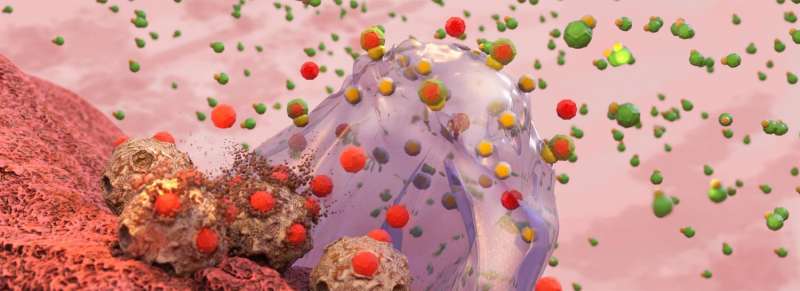Local drug activation at solid tumor sites

Sarcoma is an aggressive form of cancer responsible for up to 20 percent of childhood cancers. Tumors often first appear in the extremities and the abdomen. Surgery is a primary treatment, but it often is combined with chemotherapy. This week in ACS Central Science, researchers propose a scheme to target chemotherapy medications specifically to sarcomas, leading to greater efficacy and fewer side effects.
Jose Mejia Oneto, Max Royzen and colleagues developed a technology that shields a toxic and commonly-used chemotherapeutic, doxorubicin, until it comes into contact with an activating agent held at the tumor site by a polymer material. While both the traditional delivery of doxorubicin and the new approach were successful in the initial treatment of sarcoma tumors in mice, only the site-activated drug kept the cancer from coming back.
In addition to a better therapeutic outcome, the local activation strategy had fewer side effects. In particular, the researchers did not observe a decrease in new red blood cells, a marker of bone marrow suppression which limits the tolerable dose in patients. Other unpleasant side effects such as weight loss or changes in hair were not observed compared to those treated conventionally.
The authors intend to leverage the lower toxicity of their treatment to investigate whether shorter courses of their therapy using higher doses are even more effective and expand this approach to other solid tumors and drugs.
More information: Jose M. Mejia Oneto et al. In Vivo Bioorthogonal Chemistry Enables Local Hydrogel and Systemic Pro-Drug To Treat Soft Tissue Sarcoma, ACS Central Science (2016). DOI: 10.1021/acscentsci.6b00150
Abstract
The ability to activate drugs only at desired locations avoiding systemic immunosuppression and other dose limiting toxicities is highly desirable. Here we present a new approach, named local drug activation, that uses bioorthogonal chemistry to concentrate and activate systemic small molecules at a location of choice. This method is independent of endogenous cellular or environmental markers and only depends on the presence of a preimplanted biomaterial near a desired site (e.g., tumor). We demonstrate the clear therapeutic benefit with minimal side effects of this approach in mice over systemic therapy using a doxorubicin pro-drug against xenograft tumors of a type of soft tissue sarcoma (HT1080).














